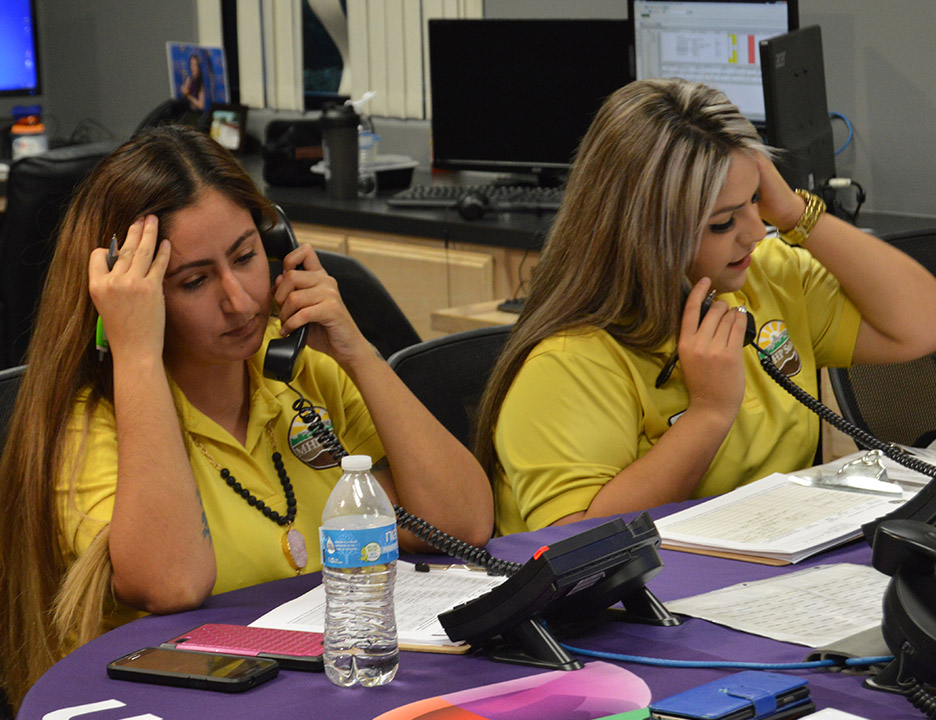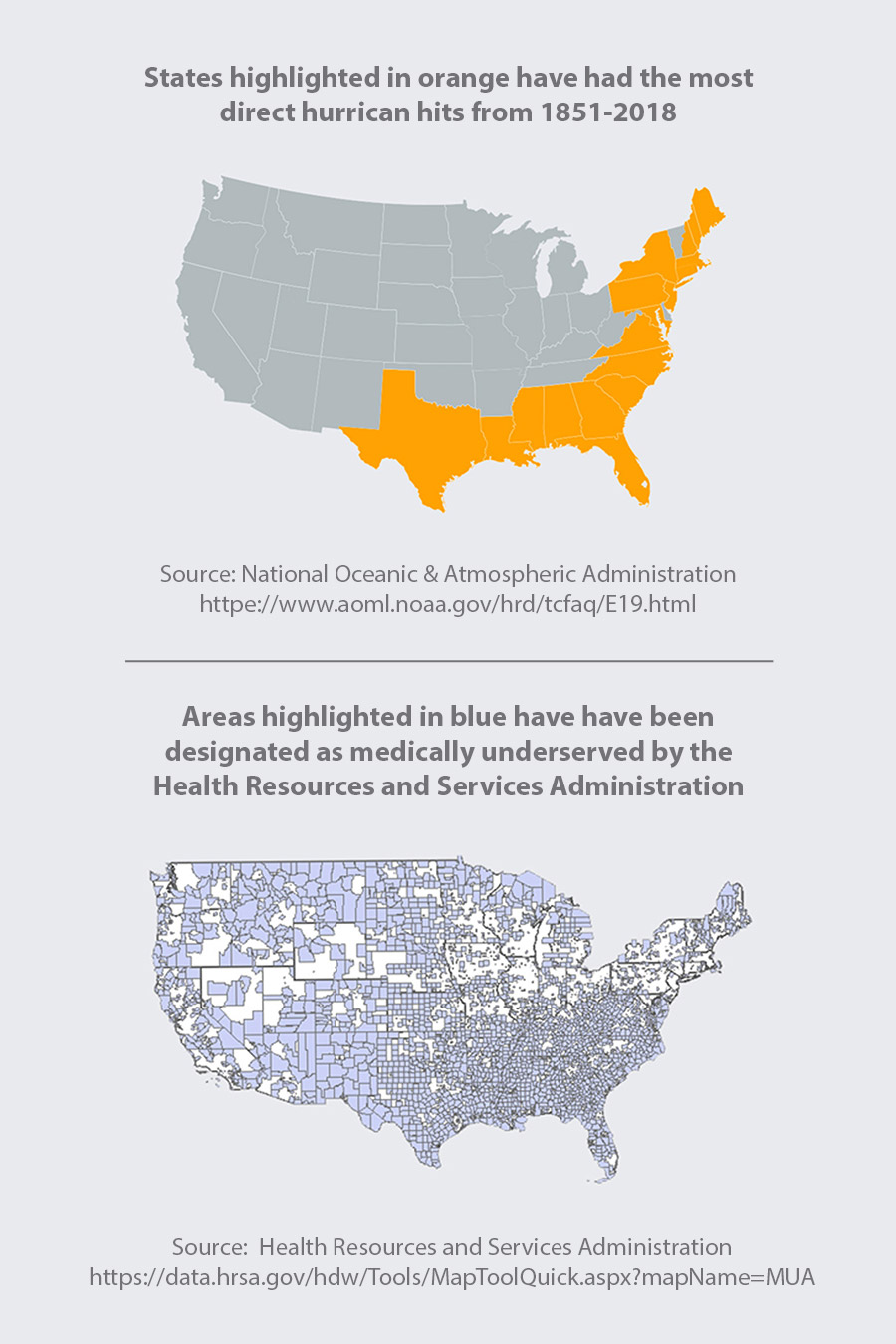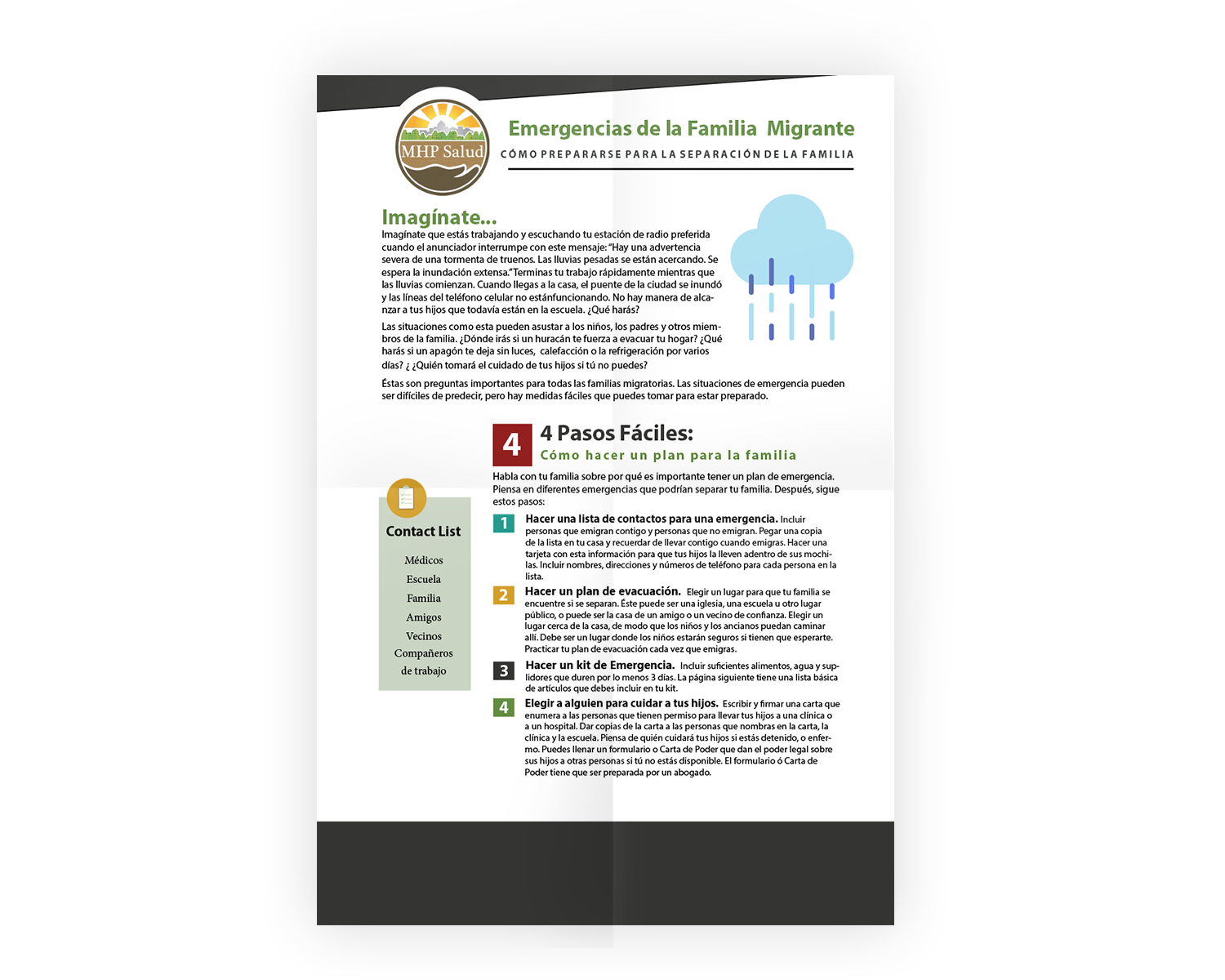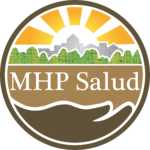Community Health Workers know how to bring valuable information to the community.
The consequences of a natural disaster can be life-changing. Strong storms and hurricanes can cause destruction of a home, damage to personal belongings, limited access to medical care, and even the loss of a loved one. Community Health Workers, who are trusted members of their community and empower their peers through education and connections to health and social resources are in the best position to provide help. With information on local resources, contacts to emergency services, and by helping families create a safety plan, they can assist with mitigating the physical and economic impact disasters can cause. For low-income families, this is especially crucial as they often have difficulty preparing and recovering due to limited financial resources and barriers when trying to access community resources. 11
Because CHWs come from the communities they serve, they are experts on what outreach methods work best and have unique insight on what resources are available in their region. The ability to identify and effectively mobilize information into their local communities is what sets CHWs apart from other health professionals. Their close ties with individuals make them a critical component for families when determining whether to stay or evacuate during a storm, as well as where to receive support once communities begin to recover. For years MHP Salud CHWs have been helping families prepare during hurricane season in one of the most active storm regions in the U.S. (Texas and Florida).
CHWs Are Outreach Experts
No two communities are alike. This is why being from the community is such a valuable component of the CHW profession. This quality makes them effective at conducting outreach in areas that other health professionals don’t have access to. For example, CHWs may set up informational tables and hold educational sessions in facilities that community members are already familiar with and comfortable with, like churches and community centers. Perhaps what makes CHWs outreach strategies most unique is that they can be adapted to be implemented anywhere, across a variety of formats, to any population.
Community Health Workers Take Action During the Coronavirus Outbreak
Proof of this is shown by MHP Salud CHWs during the current COVID-19 outbreak. When states mandated “shelter in place” orders and social distancing measures, CHWs close relationships with individuals put them in the best position to personally call former, present, and prospective participants of their programs to make them aware that we are still providing services and that we are offering them in a safe way. To do this CHWs print packets of health information that they would typically go over in person and delivered them to each individual who is enrolled in their program using a no-contact drop off method. Once participants have the packets, CHWs schedule calls with each individual throughout the month to review the information for each educational session.
This is critical because, during and after natural disasters, it may not be safe to travel and public transportation services could be limited or shut down. Further, during disasters news and service availability within a community could change quickly, leaving English language learners and those unfamiliar with social service processes with little or confusing information. CHWs can ensure that these people are kept up-to-date and have the resources they need without ever having to leave their homes.

Two MHP Salud CHWs make phone calls to individuals to inform them about recent changes to application deadlines for health care coverage.
Community Health Workers work with local and government agencies, medical facilities, and community-based organizations.
Families living in low-income or hard-to-reach areas often struggle with finding reliable transportation, which limits their access to resources like emergency services, shelters, and community health centers. Some families may not have a car or money for gas, forcing them to rely on limited public transportation options. In the event of a natural disaster, such as a hurricane, it is imperative that these families understand their options so that they may plan ahead for travel.
CHWs can help in this planning process. Their in-depth knowledge of the community can be leveraged to direct families to services that can help address their unique situations. They can provide information on how to reach emergency rescue services and hurricane shelters. CHWs can also inform families where they will be able to find reliable information on the storm and evacuation recommendations so that when a storm hits, they can take the appropriate actions.
Lack of transportation aside, even if families can get to resources, they often face problems trying to recover after a natural disaster. Low-income families often don’t have the means to make home repairs or relocate after a hurricane. Overall, low-income families are less likely to access disaster relief aid, like charities and government programs because they may not know which organizations provide the services and language and cultural differences can make the application process difficult.
CHWs can inform the community what relief programs will be available and know which resources provide services that are bilingual, which has been shown to help people with limited English proficiency feel more comfortable in seeking help.6 CHWs can also help navigate the application process, ensuring families understand their options and are informed about what requirements they’ll need to meet.
Community Health Workers have trusted relationships with the communities they serve.
CHWs establish trusting relationships with families in the communities they serve and become a reliable source for information. Furthermore, CHWs are able to present this information in a manner that is culturally and linguistically competent, which results in a deeper understanding of the subject matter. For example, there are universal steps families can take to maintain their safety during a hurricane. While these steps are often shared online or in classes, they may not be readily accessible to someone living in a low-income area or who speaks a different language. CHWs can distribute this information and present it in a manner that is catered for their community.
Deploying CHWs to help families with disaster preparation is not uncommon. For example, here is an Emergency Checklist that is utilized by MHP Salud’s CHWs. Although this checklist was created to help families prepare for an emergency separation, many of the actions on it are comparable to those that would be taken to prepare for a hurricane. Some of these actions include restocking emergency supplies, making an evacuation plan, and properly storing IDs and other important documents.
This free Migrant Family Emergency Checklist contains important questions for all migrant families in emergency preparedness. Additionally, it contains resources families can use to create their own checklists. It is available for immediate download after registration to our resource portfolio.
Natural Disasters in Medically Underserved Communities
Medically underserved areas are described by Health Resources and Services Administration as areas or populations that have too few primary care providers, high infant mortality, high poverty or a high elderly population.10 These locations also tend to have a high percentage of the population that lives below the poverty line.
Between 1851 and 2018, more hurricanes have hit states with a high concentration of medically underserved areas than anywhere else in the U.S. The two maps below illustrate just how many underserved areas face these natural disasters.
States like Florida (120 hurricanes), Texas (64), Louisiana (54), and North Carolina (56) have had the most hurricanes in the US in the last 30 years.3These states also have some of the highest numbers of medically underserved areas.
Natural disasters have pushed 26 million people into poverty over the last decade.2 In fact, recent research indicates that affluent families are likely to build wealth after a disaster while low-income renters and minorities lose it.12
Most recently we’ve seen the effects of hurricanes like Maria, which killed thousands of citizens, crippled infrastructure and impacted local economies.
As hurricane season approaches, it’s worth exploring how Community Health Worker programs can help save lives by preparing families for natural disasters. MHP Salud can help any organization looking to start or strengthen a CHW program through our Training and Consulting services.

- https://www.ncbi.nlm.nih.gov/pmc/articles/PMC2875675/
- http://www.worldbank.org/en/news/press-release/2016/11/14/natural-disasters-force-26-million-people-into-poverty-and-cost-520bn-in-losses-every-year-new-world-bank-analysis-finds
- https://www.aoml.noaa.gov/hrd/tcfaq/E19.html
- https://www.ready.gov/hurricanes
- https://www.ncbi.nlm.nih.gov/books/NBK19910/
- https://med.stanford.edu/news/all-news/2015/09/spanish-speaking-families-prefer-native-language-when-discussing.html
- https://data.hrsa.gov/hdw/Tools/MapToolQuick.aspx?mapName=MUA
- https://www.brookings.edu/blog/social-mobility-memos/2017/09/18/hurricanes-hit-the-poor-the-hardest/
- https://www.samhsa.gov/sites/default/files/dtac/srb-low-ses_2.pdf
- https://data.hrsa.gov/tools/shortage-area/mua-find
- https://hfront.org/2018/09/12/thousands-of-low-income-families-threatened-by-hurricane-florence/
- https://nlihc.org/resource/natural-disasters-exacerbate-wealth-inequality
About MHP Salud
MHP Salud has over 35 years of experience implementing CHW programs and training organizations looking to start and/or strengthen their own CHW programs. For more information about MHP Salud, our services, and how we can help you, please email us at info@mhpsalud.org.



